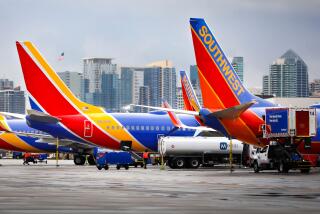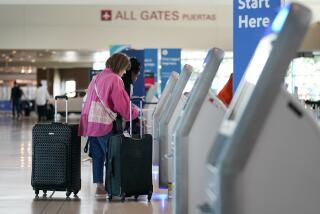VIEWPOINTS : Blame Uncle Sam Where Deregulation of Airlines Has Created a Big Mess
The deregulation of the airlines has done almost everything we expected. It has provided air travelers the benefits of price competition: Between 1976 and 1986, the average fare per mile rose 28.5% less rapidly than the consumer price index.
It also brought travelers a wider range of price and quality options, forced the airlines to achieve striking improvements in efficiency and exerted very healthy downward pressure on grossly inflated wages.
Even the popular supposition that the quality of service has deteriorated is probably more wrong than right.
Thanks to the Essential Air Services program, not one community that enjoyed licensed airline service when the deregulation act was passed in 1978 lacks it today.
Communities of all sizes generally have gotten more, not less, air service. And accident rates are down at least 35%.
At the same time, congestion and delays have clearly increased. Travelers’ complaints are on the rise. And it may well be that the margin of safety has narrowed.
Increasing congestion and inconvenience are not in themselves signs of failure.
After deregulation, aggressive airlines offered the public low fares with, necessarily, less expensive service: narrower seating, longer lines and fewer amenities. The enormous response to these new options is a vindication, rather than a condemnation, of deregulation.
These annoyances, however, are largely the result of major failures of government policy.
To begin with, the government has failed to expand airport and air traffic control capacity adequately.
Travelers pay an 8% tax on every ticket they buy; it is supposed to pay for maintaining and expanding airports. But more than $5 billion of that revenue has accumulated in the Airport and Airways Trust Fund.
You might call it a kind of reverse user fee--users pay for government services but don’t receive them; instead, the $5 billion helps reduce the federal budget deficit.
Meanwhile, the Reagan Administration periodically assures us that there are plenty of air traffic controllers; then they hasten to add that they have a program to train hundreds more.
Most Americans supported the President’s vigorous response to the controllers’ strike in 1981. But it appears that the controllers’ working conditions were, in fact, abominable and that the Federal Aviation Administration had for years been unresponsive to their complaints.
Considering that we apparently need these controllers, the unwillingness of the government to hire any of them back after more than five years is sheer vindictiveness, a triumph of ideology over humanity and the interests of the flying public.
The FAA blames the airlines for bunching too many flights at busy times and at congested airports. For the second time in two years, it is telling them to get together, under exemption from the antitrust laws, and divide the scarce slots among themselves.
By doing so, the FAA is reimposing a cartel far more comprehensive than the Civil Aeronautics Board ever administered: It was prohibited from controlling scheduling.
But the fault does not lie with the airlines: They are behaving exactly the way we want and expect under competitive pressure, trying to give the public what it wants. The failure instead lies with the FAA and the airports for not pricing the scarce slots and air channels correctly.
There are two ways to handle the congestion problem, and neither involves telling the airlines to get together and divide up the market. One would be for airports to charge landing fees that vary by time and by place, to encourage a more even flow of traffic.
Another would be to limit the supply of available slots to the number of flights that airports actually can handle and then auction them off to the highest bidders.
The market does not solve all our problems, but it takes a special kind of idiocy to refuse to let it do jobs that it obviously could do with far greater efficiency and equity than a market-sharing cartel of carriers or a bunch of bureaucrats itching to run the whole system themselves.
The willingness of the FAA, in effect, to force antitrust exemptions and cartelization upon a reluctant industry is only one manifestation of its failure to appreciate the purposes and importance of antitrust laws.
Deregulation makes enforcement of the antitrust laws more important, not less. The reason we abolished economic regulation of the airlines, as it was practiced from 1938 to 1978, was that it systematically suppressed competition. The goal of deregulation was a competitive airline industry; the goal of antitrust is to keep it that way.
Nowhere is the complacency of this Administration about the need for antitrust enforcement clearer than in the blanket approvals that the Department of Transportation has given to the mergers rapidly transforming this industry, in several instances over the objections of the Justice Department’s antitrust division.
Not all mergers are bad, by any means. But some of the recent ones have directly suppressed competition and left travelers on many routes with only one or two airlines, when previously they had two or three.
The result, in several glaring cases, has been higher fares and poorer service. The Transportation Department’s dismissal of some Justice Department complaints against the Northwest-Republic and TWA-Ozark mergers was a serious mistake.
If we are to judge by its past behavior, Transportation will probably rubber-stamp the proposed combination of USAir and Piedmont, even though they dominate traffic in New York, Pennsylvania and Ohio, and compete directly against one another--and often with no one else--on many routes.
Finally, even the strongest believers in free markets--that includes me--have always recognized the necessity of protecting consumers against deceit, fraud and violation of implicit contracts.
When an airline says you have a confirmed reservation and then proposes to bump you because it has overbooked its seats, it has engaged in misrepresentation; that’s why, when I was chairman of the CAB, we imposed the rule requiring airlines to offer large enough bribes to get volunteers to give up their seats. The rule has been something close to a complete success.
The same thing is certainly true when an airline advertises that a flight will leave at 8 a.m. from a crowded airport and reach its destination at, say, 9:20 a.m., when it knows it cannot possibly do so because of overscheduling.
Nothing is going to discredit deregulation more quickly than government’s failure to fulfill its proper responsibilities. As with all other industries, that clearly includes enforcing antitrust laws and consumer protection laws.
The greatest danger of reregulation is posed by the laissez-faire zealots who don’t understand the difference between government actions to preserve competition and the restrictions on competition that we did so well to abandon.
More to Read
Sign up for The Wild
We’ll help you find the best places to hike, bike and run, as well as the perfect silent spots for meditation and yoga.
You may occasionally receive promotional content from the Los Angeles Times.






